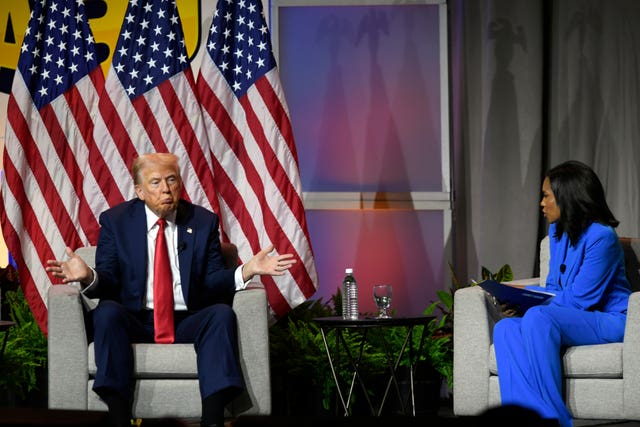
Iain Dale 10am - 1pm
31 July 2024, 21:14

The Republican former president wrongly claimed that in the past Kamala Harris only promoted her Indian heritage.
Donald Trump has falsely suggested Kamala Harris misled voters about her race as the former president appeared before the National Association of Black Journalists in Chicago.
The Republican former president claimed that Ms Harris, the first black woman and Asian American to serve as vice president, had in the past only promoted her Indian heritage.
“I didn’t know she was black until a number of years ago when she happened to turn black and now she wants to be known as black. So, I don’t know, is she Indian or is she black?” Mr Trump said while addressing the group’s annual convention.
Ms Harris is the daughter of a Jamaican father and an Indian mother, both immigrants to the US.

As an undergraduate, Ms Harris attended Howard University, one of the nation’s most prominent historically black colleges and universities,
As a US senator, Ms Harris was a member of the Congressional Black Caucus, supporting her colleagues’ legislation to strengthen voting rights and reform policing.
Mr Trump has levelled a wide range of criticism at Ms Harris since she replaced President Joe Biden on the likely Democratic ticket last week. Throughout his political career, the former president has repeatedly questioned the backgrounds of opponents who are racial minorities.
White House press secretary Karine Jean-Pierre was asked during her briefing with reporters on Wednesday about Mr Trump’s remarks and responded with disbelief, initially murmuring “wow”.
Ms Jean-Pierre, who is black, called what Mr Trump said “repulsive” and added: “It’s insulting and no one has any right to tell someone who they are how they identify.”
Mr Trump has repeatedly attacked his opponents and critics on the basis of race.
He rose to prominence in Republican politics by propagating false theories that President Barack Obama, the nation’s first black president, was not born in the United States. “Birtherism”, as it became known, was just the start of Mr Trump’s history of questioning the credentials and qualifications of black politicians.
During this year’s Republican primary, he once referred to former UN ambassador Nikki Haley, the daughter of Indian immigrants, as “Nimbra”.

Mr Trump’s appearance on Wednesday at the annual gathering of black journalists immediately became heated, with the former president sparring with interviewer Rachel Scott of ABC News and accusing her of giving him a “very rude introduction” with a tough first question about his past criticism of black people and black journalists, his attack on black prosecutors who have pursued cases against him and the dinner he had at his Florida club with a white supremacist.
“I think it’s disgraceful that I came here in good spirit. I love the black population of this country, I’ve done so much for the black population of this country,” Mr Trump said.
He continued his attacks on Scott’s network, ABC News, which he has been arguing should not host the next presidential debate, despite his earlier agreement with the Biden campaign.
The Republican also repeated his false claim that immigrants in the country illegally are “taking black jobs”. When pushed by Scott on what constituted a “black job”, Mr Trump responded by saying “any job”, drawing groans from the room.
At one point, he said: “I have been the best president for the black population since Abraham Lincoln.”
The audience responded with a mix of boos and some applause.
Scott asked Mr Trump about his pledge to pardon people convicted for their roles in the January 6 2021, riot at the US Capitol and specifically whether he would pardon those who assaulted police officers.
Mr Trump said “oh, absolutely I would,” and added: “If they’re innocent, I would pardon them.”
Scott pointed out they have been convicted and therefore are not innocent.
“Well, they were convicted by a very, very tough system,” he said.
He then falsely claimed that people were not arrested in the unrest in Minneapolis and other cities following the death of George Floyd by Minneapolis police in 2020.